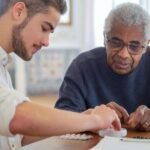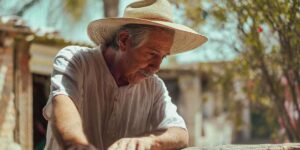
Every Year Many Elderly People Fall and Are Sent to the Hospital
Thanks to the advancement of medical treatment and science and technology, people are living longer and longer. The importance of living healthy in old age cannot be underestimated. According to NHS, around 1 in 3 adults over 65 and half of people over 80 will have at least one fall a year. The most frightening thing is that the elderly had to stay in bed for a long time due to a fall, and all the pain came. Not only did they lose their mobility, they might even lose their life.
In addition to being careful and avoiding unsafe environments, “preventing falls for the elderly” is more important to increase one’s muscle endurance, balance, and flexibility. However, UK has never been a country with a very strong sports culture. Many elders when they are young, they are busy working for their family, you may not have the opportunity to develop exercise habits. For seniors who want to prevent falls, or for young readers who want to inspire their parents and grandparents to move, you can refer to the following four points to integrate sports into their life.
- Step by step
For elders who want to regain the fun of sports, taking on heavy-training sports that require a high degree of muscular endurance at the beginning can easily scare away their “ambition” of a healthy and happy life. The habit of exercising should be developed slowly. Accumulation bit by bit is more important than starting in a hurry. - Set short-term goals
Setting short-term goals is a great way for seniors to get motivated to exercise. Giving a goal is like giving a direction, so that the concept of exercise no longer only reminds people of “sweating” or “exhausted”, but has a new meaning. It is worth noting that it is best not to set goals such as “lose three kilograms in a month”, because this will bring unnecessary psychological burden to the elders and dampen the willingness to exercise. It is suggested that “reducing stress” or “increasing energy” should be more appropriate goals. - Keep everything simple
Elders are most afraid of trouble. If you want them to exercise well, the biggest prerequisite is that it should be simple and easy to learn, so the movements should not be too challenging and should preferably be exercises that are familiar to the elders. The equipment should not be too complicated, and the closer the sports venue is to home, the better. For example, the community sports center in the alley, the park downstairs, the nearby river embankment, etc. may be far better than well-equipped facilities, but the elders cannot reach them by walking to high-end gym. - Diverse and interesting with many friends
If you can only do a single exercise, it will feel boring and boring, and you will lose motivation to continue over time. It is recommended that elders try different types of exercise or add other interesting elements to their exercise. For example, you can play pleasant music while dancing, put on headphones while jogging, and listen to your favorite programs. Of course, “having fun alone is not as good as having fun together.” Exercise together with friends or good neighbors, and everyone can accompany each other to establish communication and connections between people, which is also very beneficial to the mental health of the elders. - Safety concern
Finally, I remind everyone that safety comes first! When it rains and the roads are slippery, elders are advised to avoid exercising outdoors as much as possible. If you feel any physical discomfort, even slight dizziness, breathlessness, or palpitations, do not ignore it and stop exercising immediately. If you have health concerns or are reluctant to exercise due to concerns about muscle injury, it is recommended to consult a medical professional.













